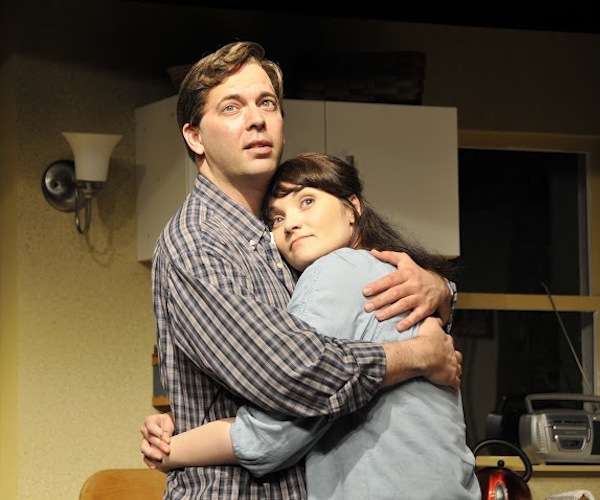Theater Review: “Outside Mullingar” — A Poignant Irish Rom Com
John Patrick Shanley’s Outside Mullingar is a romantic comedy, so you can guess the dénouement, but all the fun is in getting there.
Outside Mullingar by John Patrick Shanley. Directed by Gus Kaikkonen. Staged by the Peterborough Players, Peterborough, New Hampshire, through July 26.

Tom Frey and Bridget Beirne in the Peterborough Players production of “Outside Mullingar.” Photo: Deb Porter-Hayes.
By Jim Kates
Rather than fashioned as a seamless garment, John Patrick Shanley’s romantic comedy Outside Mullingar is a bright patchwork quilt of familiar Irish themes and conventions. It begins in the aftermath of a wake, continues with references to conflicts between father and son, family history, and inheritance, and turns on the sociology of Irish men’s reluctance to commit to marriage until middle age and Irish women’s long-suffering manipulation of their menfolk. There’s also a sentimental death-bed confession of previously unspoken love. But, mercifully free of excessive drink, pig-in-the-parlor peasantry, and political references to the Troubles near and far, Outside Mullingar still manages to feel completely up-to-date. This is an Ireland of the Celtic Tiger and easy access to the rest of the world.
But the universal is found within the particular: the play is set between two farms located just outside Mullingar, a town notorious in song and story and a laughing stock for generations as being the dullest, most provincial municipality in the Emerald Isle.
Here, side by side when the curtain goes up, live the recently bereaved Aiofe Muldoon (Dale Hodges) and her daughter Rosemary (Bridget Beirne) on one farm, while Tony Reilly (Michael Page) and his son Anthony (Tom Frey) manage the other. The Reilly farm has been encumbered by a right-of-way that Tony once sold to the Muldoons, a point of irritating contention between the two families when Tony, confronted with the mortality of his neighbor and his own, tries to settle the disposition of his estate.
Rosemary Muldoon is encumbered by a smoldering love for Anthony, hidden under a superficial dislike but obvious to the audience as well as to her mother. Anthony is encumbered by a secret that comes into the open in the last scene and will not be revealed here. Because Outside Mullingar is a romantic comedy, you can guess the dénouement, but all the fun is in getting there.
The first three quarters of the play are a bit hard going in spite of good jokes that generate easy laughter. The comedy comes and goes, but the chief drag on the proceedings is Tom Frey’s Anthony. Call the character what you will — a stick-in-the-mud, a nebbish — the actor playing the part should suggest some spark of energy, some hint of why Rosemary is carrying a torch, some glint of depth that is usually hidden beneath his surface of zero-ness. These layers are very difficult to convey, and Frey doesn’t quite get there. He barely moves, he stands with his hands at his sides, conveying less repression than stagnation.
Page, on the other hand, is a past master of sitting or lying still and communicating inner turmoil rigidly controlled. When he leaves a scene, there is some danger that he will take all of the production’s energy with him. Likewise, Hodges infuses a bit of a dowager presence in her interpretation of the Muldoon widow, neighbor, and mother. Her expression of the character’s inner motivation is more outward, more straightforward than Page’s, but equally commanding.
Beirne begins almost as passively static as Frey, but she slowly becomes more animated. That may be because her character has much less to conceal, and then she risks more and more as the play proceeds, initially in a feisty confrontation with the older Reilly, and later with the son. Beirne’s dramatic task may be easier in theory than Frey’s, but she brings to it a passion that earns our trust. It would have made things easier dramatically had there been more combustible chemistry between her and Frey. Their delivery of their lines bear the burden suggesting the emotion underlying their long struggle not to express emotion.
It can be a warning sign for a production when a set-change garners applause; the scenery should not be upstaging the action. But in Outside Mullingar, Charlie Morgan’s flexible use of the set and the changes demanded by the script complement Gus Kaikkonen’s direction rather than overwhelm it. The impressive visual lead-in to the drama’s final scene is justified. Now, lifted away from the Reilly house to the Muldoon kitchen, both Rosemary and Anthony move to a new rhythm, convey a vastly different sense of urgency, and the comedy takes on new and surprising life. At the end, that almost forgotten right-of-way has been domesticated into a poignant metaphor and we rejoice in the unification of the two households.
Jim Kates is a poet, feature journalist and reviewer, literary translator and the president and co-director of Zephyr Press, a non-profit press that focuses on contemporary works in translation from Russia, Eastern Europe and Asia. His translation of Mikhail Yeryomin: Selected Poems 1957-2009 (White Pine Press) is the winner of the second Cliff Becker Prize in Translation.
Tagged: John Patrick Shanley, Outside Millingar, Peterborough Players
